ORIGINAL ARTICLE:本校公共事務中心
Want to boost your brain’s cognitive function? Just one single workout might do the trick! Professor Yu-Kai Chang from the Department of Physical Education and Sport Sciences at National Taiwan Normal University (NTNU), along with Professor Jennifer Etnier from the Department of Kinesiology at the University of North Carolina at Greensboro, recently published a groundbreaking study in Psychological Bulletin—providing integrated, pioneering evidence on the cognitive benefits of a single session of exercise.
Psychological Bulletin, founded in 1904, is one of the earliest academic journals in psychology. It is the flagship journal of the American Psychological Association and is considered a top-tier publication in the field of psychology worldwide.
NTNU held a press conference on March 4th to announce this academic achievement. The event was hosted by Vice President Yao-Ting Sung, with Research and Development Director Ying-Ru Hsu, Dean of the College of Sports and Recreation Ho-Sen Wang, Director of the Center for Social-Emotional Development Hsueh-Chih Chen, Professor Tsung-Min Hung, and Professor Yu-Kai Chang (who is also department chair) all in attendance.
As early as 2012, Professor Chang’s team published a meta-analysis in Brain Research that integrated 79 independent studies, revealing that even a single session of exercise can improve cognitive function. That study has since been cited over 2,400 times and was included in the U.S. Physical Activity Guidelines Advisory Committee Scientific Report.
However, with the increasing number, quality, and methodology of recent studies, there was a need to update and integrate existing evidence. Thus, Professor Chang collaborated with an international team to revisit the topic—this time using an advanced umbrella review (also known as a meta-review), summarizing 30 meta-analyses covering 383 independent studies, and 18,347 participants were involved. This makes it the largest and most comprehensive synthesis on this topic to date.
The study found that even a single bout of exercise produces significant cognitive benefits. Not only does it validate the findings from 2012, but it also provides subgroup analyses exploring the effects on different cognitive domains, participant backgrounds, and exercise parameters.
Cognitive Function:
- Greatest benefits were observed in attention and executive function (higher-order cognition), with additional positive effects on memory and processing speed.
- Exercise conducted after the session had more pronounced effects than during the session.
Participant Background:
- Benefits ranged from small to moderate across all ages and regardless of cognitive health status (whether healthy or clinical populations).
Exercise Parameters:
- The most effective types were mixed-mode exercise (e.g., aerobic combined with resistance training or yoga) and high-intensity interval training (HIIT).
- Aerobic exercise also showed significant benefits.
- In terms of intensity, moderate-to-high or moderate intensity yielded the strongest effects, though even high-to-maximal intensity exercises were beneficial.
- Both sessions under and over 20 minutes were found to enhance cognitive function.
How does exercise enhance cognition?
In a 2022 meta-analysis published in the International Review of Sport and Exercise Psychology, Professor Chang’s team offered a possible explanation. After just one exercise session, increased P3 brainwave amplitude and reduced P3 latency were observed—indicating greater attention resource allocation and faster information processing during cognitive tasks. These changes in brain function may represent the neural mechanisms behind exercise’s cognitive benefits.
Professor Chang’s team emphasizes the importance of single-session workouts for boosting cognitive performance. They recommend aiming for mixed-type exercise, at moderate to high intensity, and ideally for 20 minutes per session.
- Students preparing for exams: Take exercise breaks to enhance attention and executive function.
- Busy professionals: A 20-minute jog during lunch can improve processing speed and focus at work.
- Older adults: Engaging in mixed-mode exercise may help boost memory, reduce dementia risk, and improve independent living and quality of life.
Let’s make the most of our time by building the habit of daily exercise—embracing a smarter and healthier life!
(Source: Department of Physical Education and Sport Sciences / Photos: Shih Chang / Edited by: Shih-Tse Hu / English Version Powered by ChatGPT, Edited by Serena H.)

與會師長合影,由左至右為教育學院社會情緒發展研究中心陳學志主任、研究發展處許瑛玿研發長、宋曜廷副校長、張育愷特聘教授兼系主任、運動與休閒學院王鶴森院長、體育與運動科學系洪聰敏特聘教授。
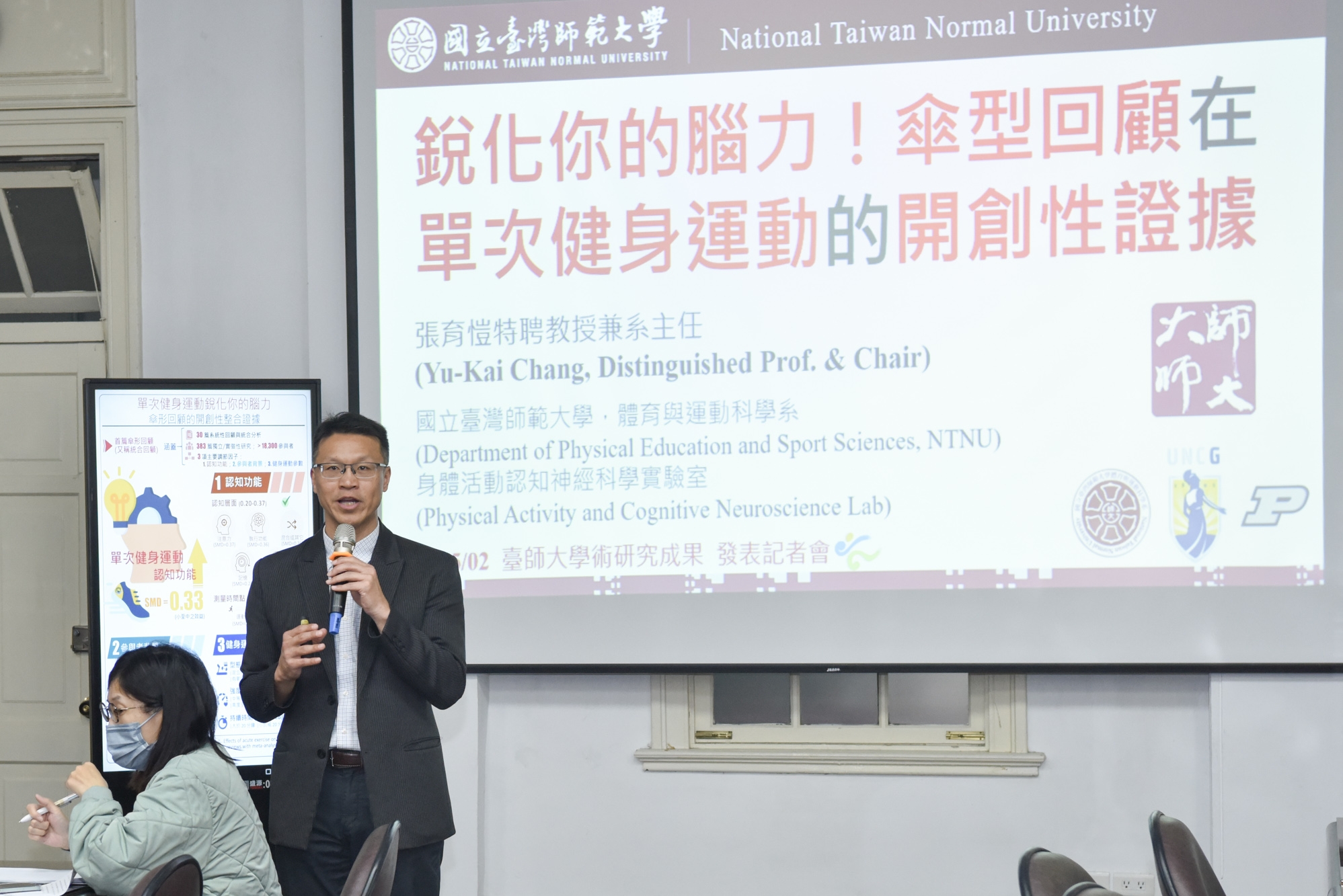
張育愷特聘教授分享單次健身運動與大腦認知功能的開創性證據。
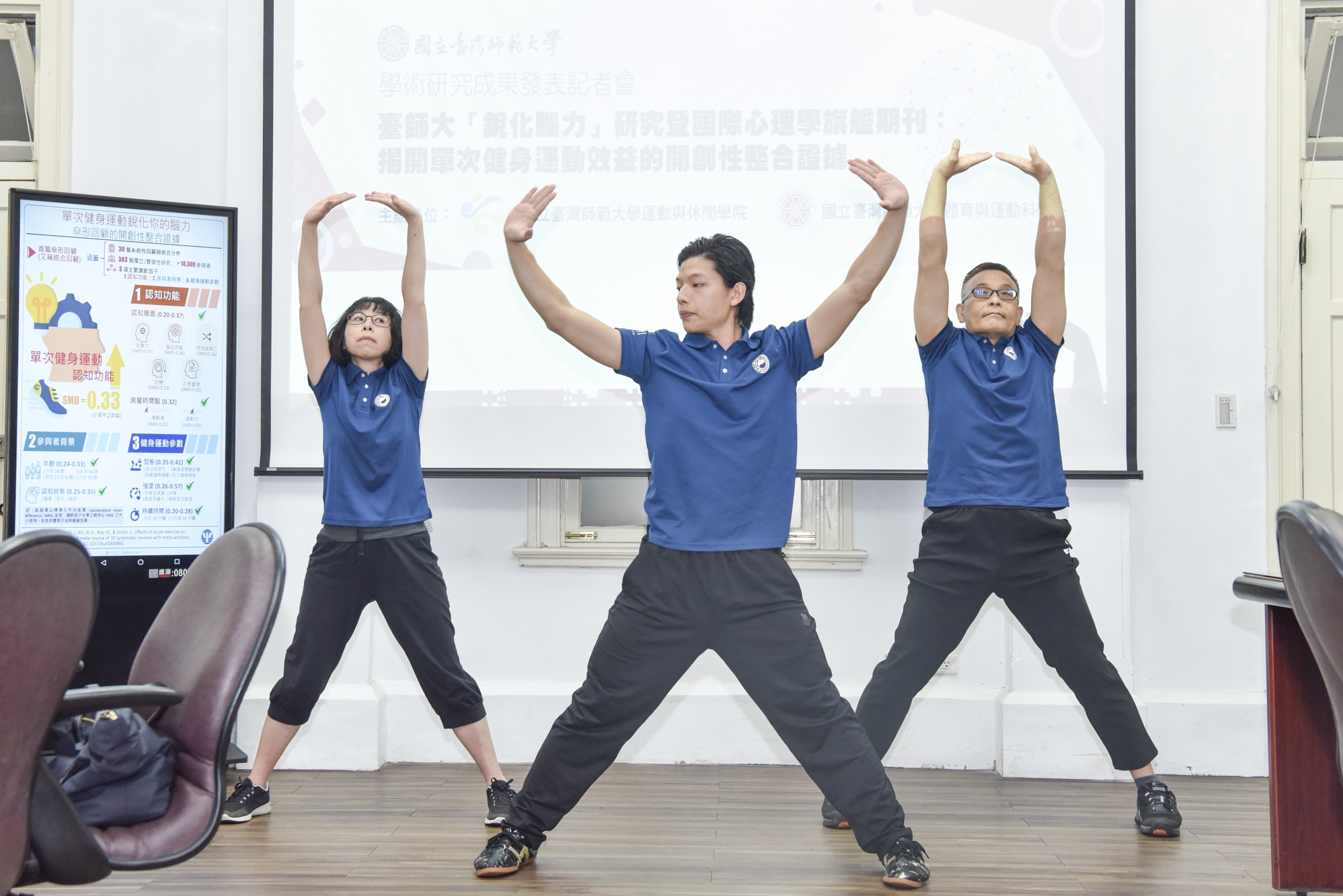
八卦導引運動展演。
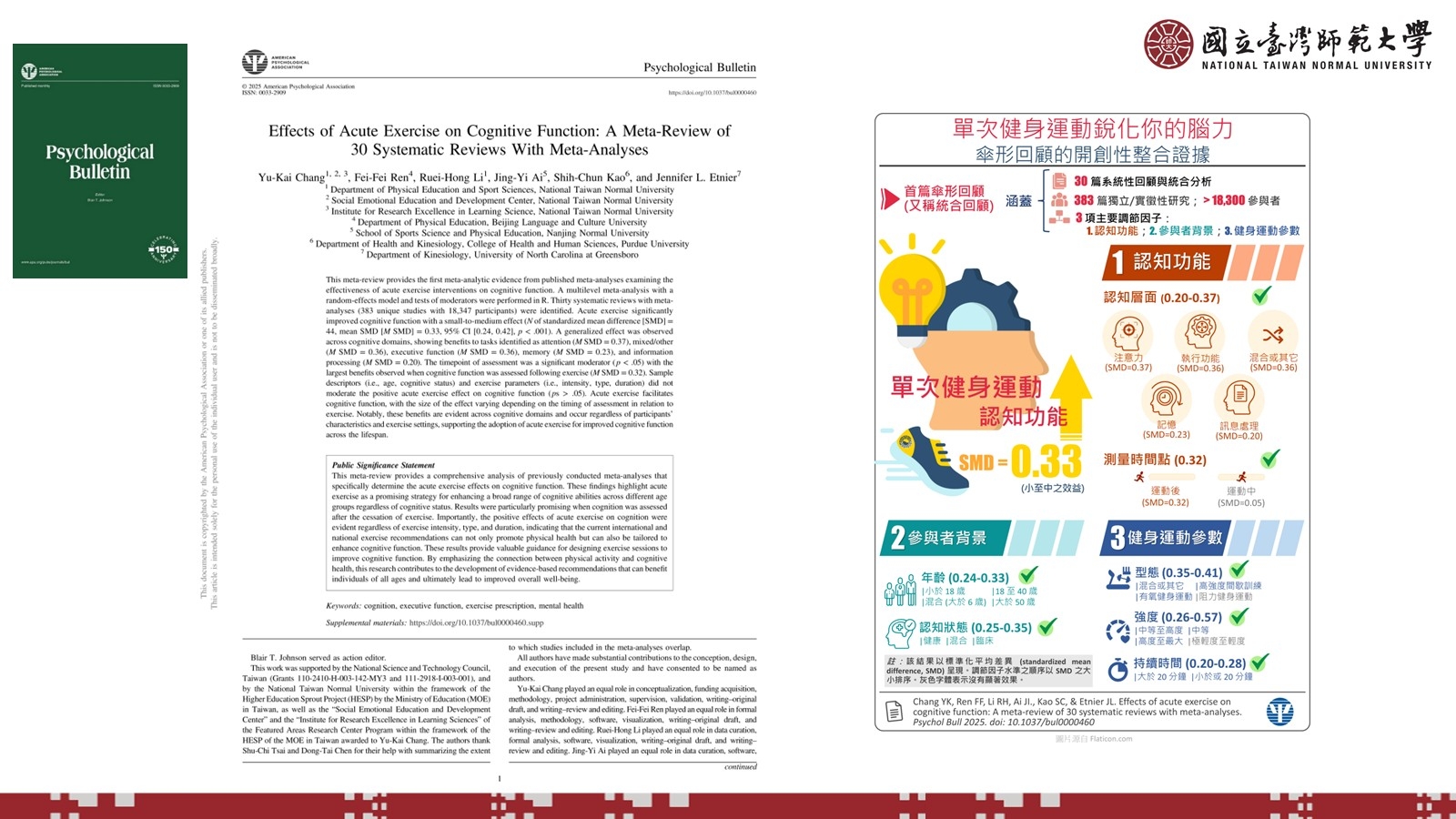

宋曜廷副校長致詞。
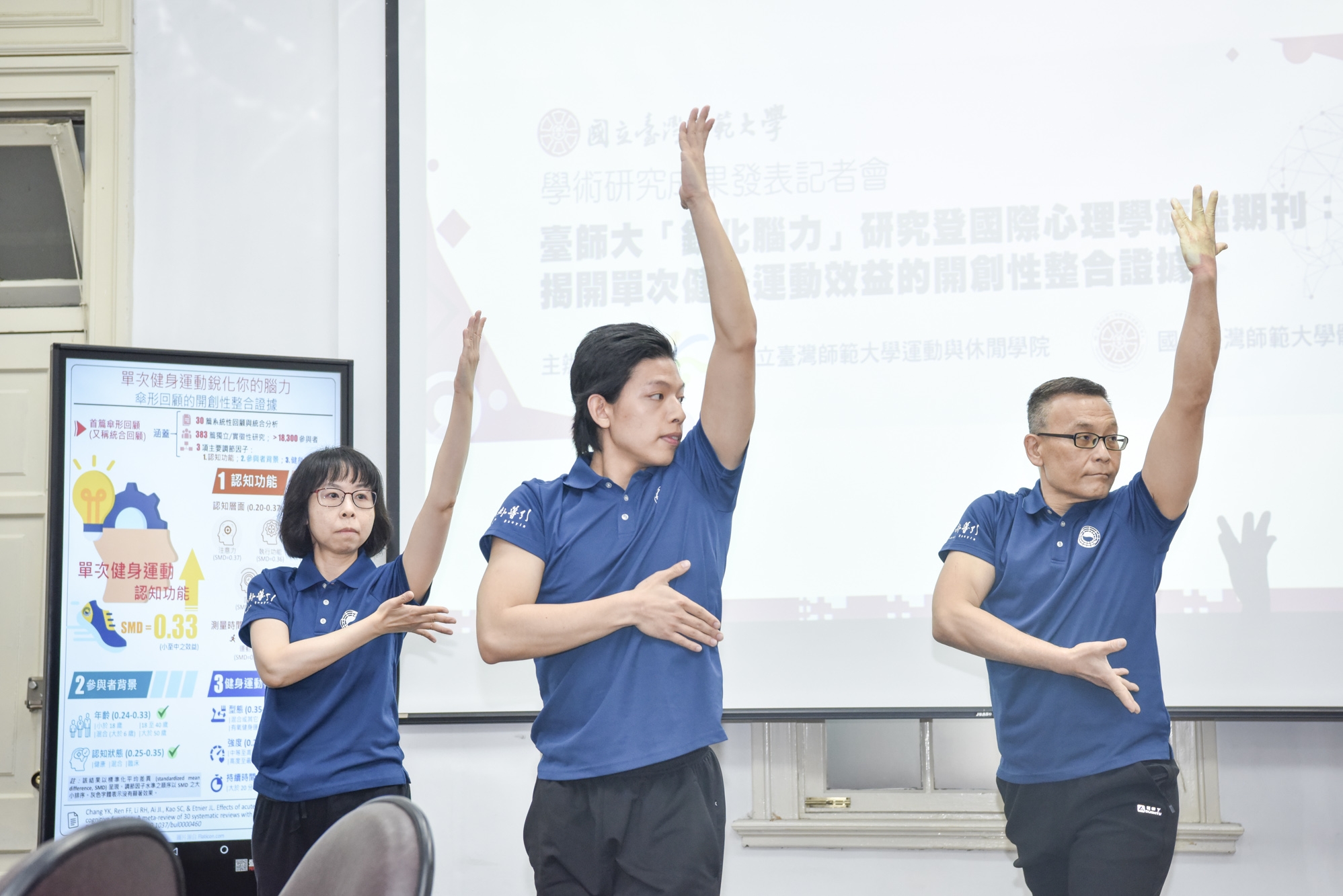
八卦導引運動展演。
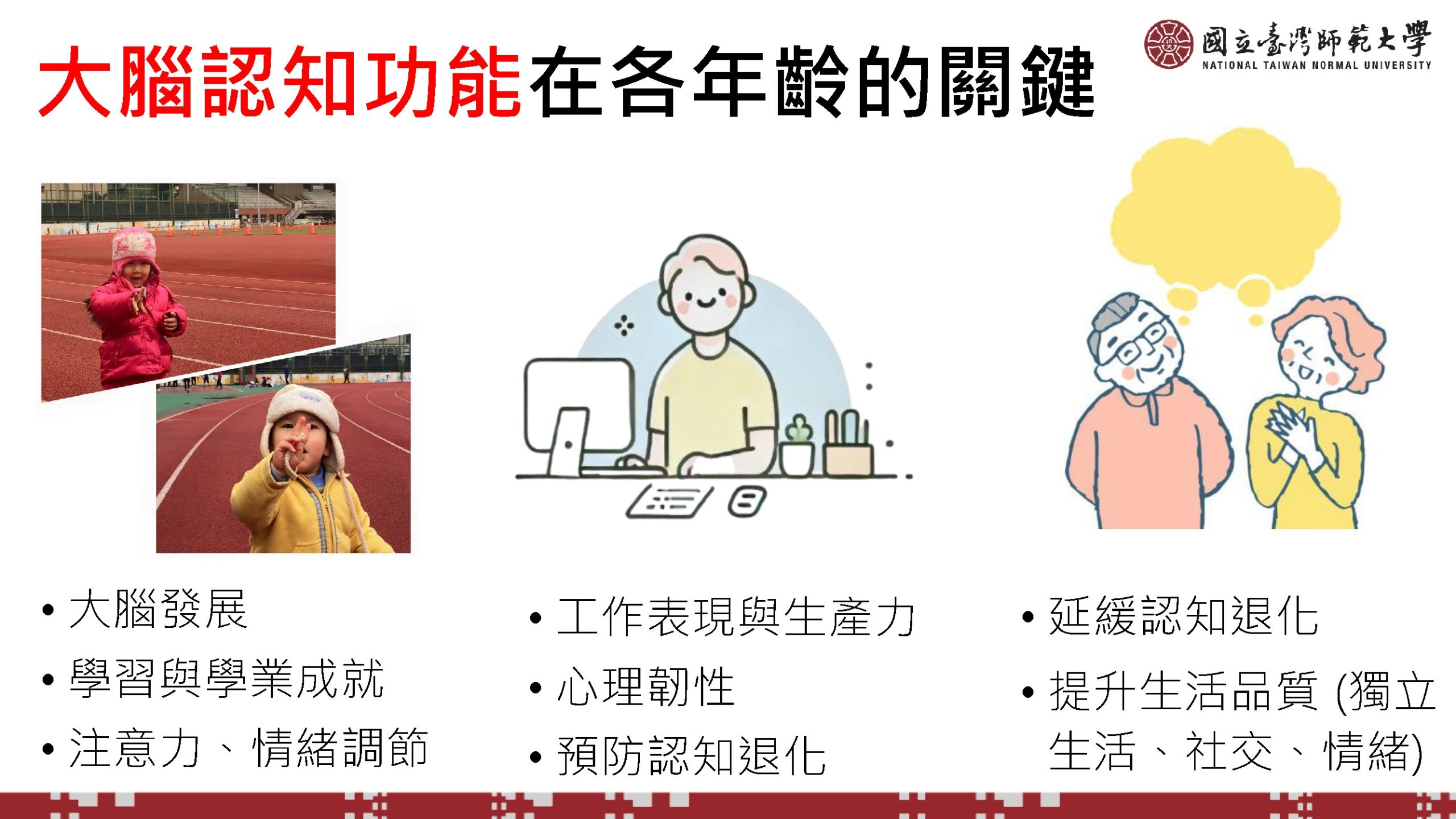

REFERENCE:
Chang, Y. K., Labban, J. D., Gapin, J. I., & Etnier, J. L. (2012). The effects of acute exercise on cognitive performance: A meta-analysis. Brain Research, 1453, 87–101.
Kao, S. C., Chen, F. T., Moreau, D., Drollette, E. S., Amireault, S., Chu, C. H., & Chang, Y. K. (2022). Acute effects of exercise engagement on neurocognitive function: A systematic review and meta-analysis on P3 amplitude and latency. International Review of Sport and Exercise Psychology. Advance online publication.
Chang, Y. K., Ren, F. F., Li, R. H., Ai, J. Y., Kao, S. C., & Etnier, J. L. (2025). Synthesizing the effects of acute exercise on cognitive function: A meta-review of 30 systematic reviews with meta-analyses. Psychological Bulletin. Advance online publication.